
“The American Library Association’s Office for Intellectual Freedom documented 1,247 demands to censor library books and resources in 2023. The number of titles targeted for censorship surged 65% in 2023 compared to 2022, reaching the highest levels ever documented by OIF in more than 20 years of tracking: 4,240 unique book titles were targeted for removal from schools and libraries. This tops the previous high from 2022, when 2,571 unique titles were targeted for censorship. Titles representing the voices and lived experiences of LGBTQIA+ and BIPOC individuals made up 47% of those targeted in censorship attempts.”
Source: https://www.ala.org/bbooks/censorship-numbers
This display celebrates both the freedom to read and literature by Latinx authors. It also brings awareness to Latinx literature targeted by censorship attempts.

The cover of "I Am Not Your Perfect Mexican Daughter" by Erika L. Sánchez features an illustration of a young girl with her back to the viewer, emphasizing her long, intricately braided hair. She is wearing a simple red top, and the background showcases a city skyline, likely representing Chicago, where the story is set. The title is prominently displayed in large white, bold letters at the top of the cover.
A National Book Award Finalist seal is located on the lower left. The color scheme features cool shades of teal and white, with the girl standing out in warmer tones. The cover’s simplicity and focus on the main character evoke a sense of introspection and personal conflict central to the novel's themes.

Title: I Am Not Your Perfect Mexican Daughter
Author: Erika L. Sánchez
Awards: National Book Award Finalist, Tomás Rivera Mexican American Children’s Book Award Winner
Location of Ban: School districts in Florida, Iowa, Mississippi, North Carolina, North Dakota, Oregon, Pennsylvania, South Carolina, Texas, Utah, and Wisconsin. Possibly more!
Date of Ban: 2021 - ongoing
Reason for Ban: Death, domestic violence, mental illness, profanity, questioning of religion, sexuality, sexual assault
Outcome: The book remains banned in many school districts. It was reinstated at the Central York School District in Pennsylvania following weeks of community protests and national media attention.

The cover of "Out of Darkness" by Ashley Hope Pérez features a striking and somber image of a tightly braided long dark hair against a muted, textured beige background. The focus is entirely on the braid, which runs from the top of the cover to the bottom.
The title, "Out of Darkness", is boldly displayed in large red-orange text, subtly blending with the background. The lower half of the braid passes through the text, creating a visual link between the title and the central image. At the top, a quote from The New York Times Book Review highlights the novel’s intense exploration of race, love, and struggle in East Texas. A Michael L. Printz Honor Book seal is placed to the right, acknowledging the book’s critical recognition for excellence in young adult literature.

Title: Out of Darkness
Author: Ashley Hope Pérez
Awards: Tomás Rivera Mexican American Children’s Book Award Winner, Américas Award, Michael L. Printz Award Honor
Location of Ban: School districts in Florida, Georgia, Idaho, Indiana, Kentucky, Mississippi, Missouri, New York, North Carolina, Oregon, Pennsylvania, South Carolina, Texas, Utah, Virginia, Wisconsin, and Wyoming
Date of Ban: 2021 - ongoing
Reason for Ban: sexual content and violence
Outcome: The book remains banned in many schools. It was #9 on the list of the 100 most frequently banned or challenged books in 2022 and #4 in 2021. It was published in 2015, but only banned in 2021 when a video of a parent reading a quote out of context at an Austin-area school board meeting went viral.
Click this link to read the eBook from the MCC Library.

The cover of "The Truth Is" by NoNieqa Ramos is vibrant and visually striking. Two tattooed hands form an incomplete heart, framing the title in the center. The hands, decorated with black ink illustrations of flowers and a speech bubble, represent individuality and self-expression.
The title, "The Truth Is", is written in large, bold, pink letters against a crumpled paper background. Beneath the title, black scribbles add a sense of tension or uncertainty, hinting at the book's themes of identity, truth, and inner conflict.
The background features a blue wavy pattern, adding an energetic, almost flowing feel to the design. The author’s name, NoNieqa Ramos, is handwritten on the forearm of the right hand, blending seamlessly with the artistic tattoos.

Title: The Truth Is
Author: NoNieqa Ramos
Awards: “Named one of the best YA Latinx books of 2019 by Remezcla and HipLatina.”
Location of Ban: School districts in Florida and TExas
Date of Ban: 2021 - ongoing
Reason for Ban: Sexual content, LGBTQIA+ themes
Outcome: The book remains banned in some Florida school districts to comply with the new law HB 1069. It was also banned in a Texas ISD. Finally, the book appeared on former Texas Representative Matt Krause’s list of 850 books he wanted ISDs to remove.
Click this link to read the eBook from the MCC Library.

The cover of "Always Running: La Vida Loca, Gang Days in L.A." by Luis J. Rodríguez is bold and gritty, reflecting the raw and intense themes of the memoir. The title is written in large, distressed black letters that appear worn and weathered. The background is a close-up of a peeling, chipped wall in shades of red, orange, and blue, giving the cover a textured, urban feel.
Above the title, a banner reads "A New York Times Notable Book." Below the title, the subtitle "La Vida Loca: Gang Days in L.A." gives readers a clear sense of the book’s focus on gang culture, survival, and transformation. The author’s name, Luis J. Rodríguez, is printed in bold at the bottom, grounding the memoir in the personal journey of one man through a troubled and dangerous life.

Title: Always Running: La Vida Loca, Gang Days in L.A.
Author: Luis J. Rodriguez
Awards: Carl Sandburg Literary Award, Chicago Sun-Times Book Award, New York Times Notable Book
Location of Ban: School districts in Illinois and California
Date of Ban: 1996 - 2004
Reason for Ban: Drug use, sexual content, violence
Outcome: While the book is less popular than before, Always Running is #85 on the list of the 100 most frequently banned or challenged books from 1990-1999 and #68 on the list from 2000-2009.
Click this link to read the eBook from the MCC Library.
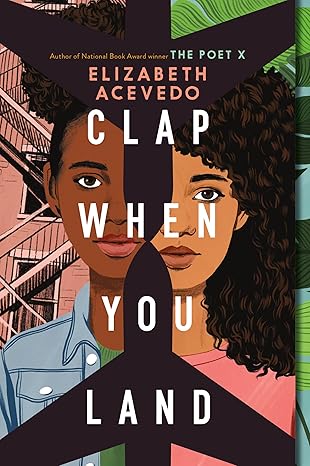
The cover of "Clap When You Land" by Elizabeth Acevedo features two young women side by side, each representing the main characters from different worlds. The left side of the cover shows a girl with dark curly hair and darker skin, wearing a blue jacket. The right side shows another girl with lighter brown skin and long curly hair, dressed in pink. Their facial expressions are serious.
The central image of a plane cuts diagonally across the cover. The plane’s dark purple silhouette divides the two girls, visually suggesting the distance and differences between them. The title, "Clap When You Land", is written in large white letters across the plane's body. Above the title, Elizabeth Acevedo’s name is displayed in bold pink text, along with the mention of her previous success with "The Poet X."

Title: Clap When You Land
Author: Elizabeth Acevedo
Awards: Goodreads Choice Awards for Best Young Adult Fiction, Audie Awards for YA & Multi-Voiced Performance
Location of Ban: Florida, Pennsylvania & Utah
Date of Ban: 2021 - present
Reason for Ban: Misogyny and sexual assault. Florida HB 1069 makes it very easy for any county resident to challenge any “age inappropriate” book in that county’s school districts.
Outcome: The book remains banned in certain school districts in Florida in an effort to comply with the new law HB 1069. It was banned briefly in the Central York School District from 2020-2021 but has since been reinstated in response to protests and national media attention.
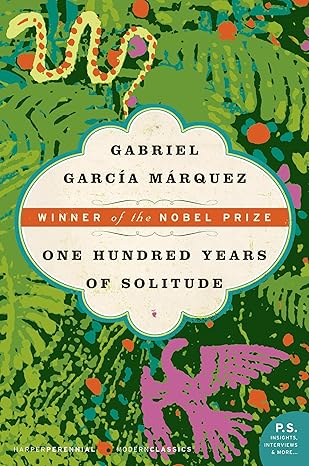
The cover of "One Hundred Years of Solitude" by Gabriel García Márquez is vibrant and full of life, reflecting the magical realism that permeates the novel. The background is a lush, tropical scene with large green leaves and colorful abstract patterns, including a snake in the upper left corner and a purple bird near the bottom.
In the middle, a white oval label holds the author’s name, Gabriel García Márquez, and the book title, "One Hundred Years of Solitude." Below the author's name, a red banner proudly announces "Winner of the Nobel Prize." The cover’s earthy greens and bright accents give it a dynamic, almost otherworldly feel, which mirrors the novel's themes of family, history, and the blending of reality with the fantastical.

Title: One Hundred Years of Solitude
Author: Gabriel García Márquez
Awards: Various international awards; García Márquez won the 1982 Nobel Prize for Literature
Location of Ban: California, Florida
Date of Ban: 1986, ongoing
Reason for Ban: Profanity, sexuality, sexual assault. Wasco Union High School (CA) officials called it “garbage being passed off as literature” in 1986, despite its critical acclaim.
Outcome: Escambia County Schools in Florida have banned 1,600 books, including One Hundred Years of Solitude (as well as five different dictionaries), because new state laws (HB 1069) forbid materials with “sexual conduct” from being in schools.
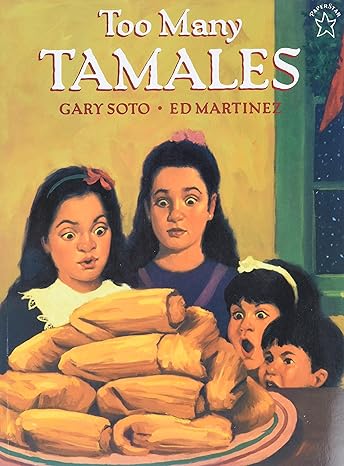
The cover of "Too Many Tamales" by Gary Soto and illustrated by Ed Martinez is playful and vibrant, capturing the curious and mischievous spirit of the story. The illustration shows four children gathered around a large plate stacked with tamales. The expressions on their faces range from curiosity to worry, hinting at the humorous trouble they are about to face. The child in the center looks serious, while the others gaze at the tamales with wide eyes, suggesting anticipation or anxiety.
The warm tones of the tamales and the festive atmosphere contrast with the children’s concerned expressions, adding to the humorous tension of the scene. Above the illustration, the title "Too Many Tamales" is written in large white letters, with the authors' names, Gary Soto and Ed Martinez, displayed in smaller red text beneath.

Title: ¡Qué montón de tamales! (Too Many Tamales!)
Author: Gary Soto
Awards: None, but Gary Soto himself has won many awards
Location of Ban: York, Pennsylvania
Date of Ban: November, 2020 - September, 2021
Reason for Ban: “What we are attempting to do is balance legitimate academic freedom with what could be literature / materials that are too activist in nature, and may lean more toward indoctrination rather than age-appropriate academic content” - Central York School District Board.
Outcome: The School Board, which voted unanimously in November 2020 to ban teachers from using hundreds of books, articles, and video materials in the classroom, voted unanimously on September 21, 2021, to reverse the ban.
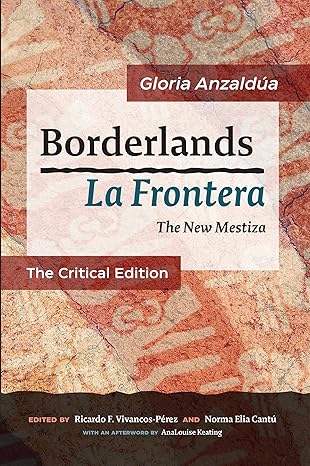
The cover of "Borderlands/La Frontera: The New Mestiza" by Gloria Anzaldúa is bold and textured. The background features abstract, earthy hues of reds, oranges, and browns that evoke a sense of land, borders, and geography.
The title is divided into two parts: "Borderlands", written in black, and "La Frontera", in italicized blue. Below the title, the subtitle "The New Mestiza" is written in smaller font, indicating the book’s focus on mixed identities and borderlands culture.
A banner at the top highlights the author’s name, Gloria Anzaldúa, in white text against a red background. Another red banner at the bottom reads "The Critical Edition." The editors’ names and the mention of an afterword are listed at the bottom, framing the cover's design.

Title: Borderlands/La Frontera: The New Mestiza
Author: Gloria Anzaldua
Awards: None, but it is considered a pioneering work of Chicana literature
Location of Ban: Arizona
Date of Ban: 2010 - ongoing
Reason for Ban: “promotes resentment towards a race or class of people”
Outcome: The book was part of the Tucson School District’s Mexican American Studies curriculum that was prohibited by Arizona HB 2281, along with other classics like The House on Mango Street and Borderlands / La Frontera.
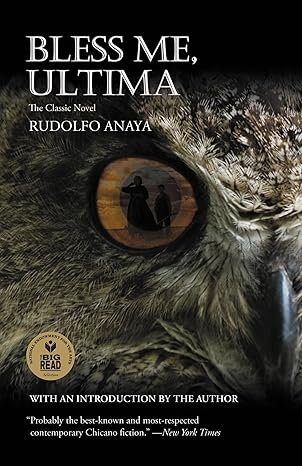
The cover of "Bless Me, Ultima" by Rudolfo Anaya is striking and symbolic. The central image is a close-up of an owl’s face, with its eye prominently displayed. Inside the owl’s eye, a shadowy silhouette of two figures—one larger and one smaller—walking together, appears. This visual suggests a journey. The black background and dark hues surrounding the owl create an atmosphere of mystery and depth.
The title "Bless Me, Ultima" is printed in bold white letters at the top, while the author's name, Rudolfo Anaya, is in smaller white text beneath it. A gold emblem marks the book as part of "The Big Read", and a New York Times quote praises Anaya's work as "probably the best-known and most-respected contemporary Chicano fiction."

Title: Bless Me, Ultima / Bendíceme, Última
Author: Rudolfo Anaya
Awards: Premio Quinto Sol
Location of Ban: Arizona, California, Colorado, Idaho, Kansas, New Mexico, Oklahoma, Texas
Date of Ban: 1981 - ongoing
Reason for Ban: Occult/Satanism, profanity, religious viewpoint, sexual content, violence
Outcome: Copies of the book were burned by the Bloomfield School Board in New Mexico, in 1981. The book was part of the Tucson School District’s Mexican American Studies curriculum that was prohibited by Arizona HB 2281, along with other classics like The House on Mango Street and Borderlands / La Frontera.
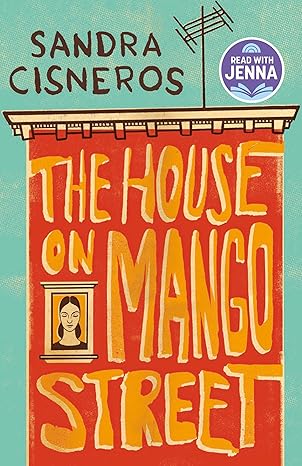
The cover of "The House on Mango Street" by Sandra Cisneros is bright and colorful. The background is a teal color, and the title is written in large, bold orange and yellow letters in a hand-painted style. Above the title, the author’s name, Sandra Cisneros, appears in green, maintaining the informal, welcoming tone of the design.
At the top of the cover, a row of brown roof shingles is depicted, complete with an old-fashioned TV antenna, giving the sense of a modest, urban home. Below the title, a small framed picture of a young girl is featured in black and white. A circular "Read with Jenna" book club logo appears on the upper right side.

Title: The House on Mango Street
Author: Sandra Cisneros
Awards: American Book Award
Location of Ban: Districts in Arizona, Florida, Michigan, Oregon, and Texas
Date of Ban: 2010 - ongoing
Reason for Ban: Domestic violence, puberty, racism, sexual harassment
Outcome: The book was reinstated in Oregon. The most widespread ban is Arizona’s House Bill 2281 from 2010. The law prohibits classes that “promote resentment toward a race or class of people, are designed primarily for pupils of a particular ethnic group, or advocate ethnic solidarity instead of the treatment of pupils as individuals.” The law remains in effect. It dismantled the Tucson school district’s Mexican American Studies curriculum, which included The House on Mango Street.

The cover of "Like Water for Chocolate" by Laura Esquivel is vibrant and evocative. The background is a soft green, setting a calm yet vivid tone for the design. At the top, the title appears in a swirling, elegant red font. The subtitle, written in yellow, reads, "A Novel in Monthly Installments with Recipes, Romances, and Home Remedies."
The central image is a stylized painting of two women in a kitchen. The woman in the foreground, dressed in white, is making tortillas with a focused, contemplative expression, while another woman works with a mortar and pestle in the background. Surrounding them are bowls, ingredients, and traditional Mexican kitchen tools.
At the bottom left, a yellow circle features a quote from USA Today: “A mystical Mexican love story that will charm the palate and the heart.” The author's name, Laura Esquivel, is written in the same red font as the title.

Title: Like Water for Chocolate
Author: Laura Esquivel
Awards: American Booksellers Book of the Year
Location of Ban: School districts in Florida, Idaho, Texas, and Wisconsin
Date of Ban: 2005 - 2018
Reason for Ban: Sexual content
Outcome: The book remains banned in some Florida school districts to comply with the new law HB 1069.

The cover of "The House of the Spirits" by Isabel Allende is a visually elegant and delicate design. The background is a soft gradient of cream transitioning into shades of orange and gold, evoking warmth and timelessness. Intricate floral and vine patterns in warm tones wind across the entire cover.
At the top, Isabel Allende's name is boldly printed in black, emphasizing her prominence as a bestselling author. Above her name, the cover notes that she is the author of The Japanese Lover. The title, "The House of the Spirits", is presented in a classic serif font, centered in the middle of the cover, with "A Novel" indicated beneath. The overall aesthetic is both modern and timeless.

Title: The House of the Spirits
Author: Isabel Allende
Awards: Many international awards, including Best Novel (Chile, Mexico, and Germany)
Location of Ban: School districts in California, Florida, Maryland, North Carolina, and Virginia
Date of Ban: 1994 - ongoing
Reason for Ban: Anti-Catholic views, sexual content, violence
Outcome: The book remains banned in some Florida school districts to comply with the new law HB 1069. It is #97 on the list of the 100 most frequently banned or challenged books from 2000-2009.

The cover of "Last Stop on Market Street" by Matt de la Peña with illustrations by Christian Robinson is vibrant and inviting, featuring warm tones and simple yet expressive artwork. The background is a bright orange, giving the cover an energetic feel. The title is written in large, playful white letters at the top, standing out against the orange backdrop.
At the center of the cover, a bus filled with diverse passengers is depicted. The bus, primarily white with colorful accents, serves as a focal point for the story. In the foreground, a young boy holds hands with an elderly woman, who is presumably his grandmother. The boy's bright yellow jacket and the grandmother’s dark dress stand out against the orange background.
The cover proudly displays several prestigious award seals, including the Newbery Medal, Caldecott Honor, and the Coretta Scott King Illustrator Honor. The overall design is cheerful, appealing to both children and adults.

Title: Last Stop on Market Street
Author: Matt de la Peña, illustrated by Christian Robinson
Awards: Newbery Medal, Caldecott Honor, Coretta Scott King Illustrator Honor
Location of Ban: York, Pennsylvania
Date of Ban: November, 2020 - September, 2021
Reason for Ban: “What we are attempting to do is balance legitimate academic freedom with what could be literature / materials that are too activist in nature, and may lean more toward indoctrination rather than age-appropriate academic content” - Central York School District Board.
Outcome: The School Board, which voted unanimously in November 2020 to ban teachers from using hundreds of books, articles, and video materials in the classroom, voted unanimously on September 21, 2021, to reverse the ban.

The cover of "Separate is Never Equal: Sylvia Mendez & Her Family's Fight for Desegregation" by Duncan Tonatiuh features his signature illustration style, blending modern graphics with pre-Columbian art influences. The title is written boldly at the top in large white letters against a gradient sky. Below the title, in smaller text, is the subtitle.
The illustration on the cover shows a group of children walking side by side. The children are divided into two groups—one group with light skin and the other with darker skin—symbolizing the segregation that Sylvia Mendez and her family worked to end. Each child carries either books or school bags. The children’s expressions are serious.
In the background, two separate school buildings stand in contrast to each other, further emphasizing the theme of segregation. The cover also features two prestigious award seals: the Robert F. Sibert Honor and the Pura Belpré Honor. The overall design is both educational and visually striking, capturing the book's focus on justice and equality

Title: Separate is Never Equal: Sylvia Mendez and Her Family’s Fight for Desegregation
Author: Duncan Tonatiuh
Awards: Tomás Rivera Mexican American Children’s Book Award Winner, Américas Award, Pura Belpré Illustrator Honor
Location of Ban: York, Pennsylvania
Date of Ban: November, 2020 - September, 2021
Reason for Ban: “What we are attempting to do is balance legitimate academic freedom with what could be literature / materials that are too activist in nature, and may lean more toward indoctrination rather than age-appropriate academic content" - Central York School District Board.
Outcome: The School Board, which voted unanimously in November 2020 to ban teachers from using hundreds of books, articles, and video materials in the classroom, voted unanimously on September 21, 2021, to reverse the ban.

The cover features a young girl with dark brown skin and a head full of curly black hair tied into a ponytail on top of her head with a pink fastener. Behind her is a vibrant, tropical cityscape, with colorful buildings, palm trees, and colorful flowers. The title "Islandborn" is written at the top in large, red and blue letters. The author’s name, Junot Díaz, is in smaller text below the title, followed by the illustrator’s name, Leo Espinosa. A silver, embossed Pura Belpré Honor Book seal is placed on the right side of the cover.

Title: Islandborn
Author: Junot Díaz, illustrated by Leo Espinoza
Awards: Américas Award, Pura Belpré Illustrator Honor
Location of Ban: York, Pennsylvania
Date of Ban: November, 2020 - September, 2021
Reason for Ban: “What we are attempting to do is balance legitimate academic freedom with what could be literature / materials that are too activist in nature, and may lean more toward indoctrination rather than age-appropriate academic content” - Central York School District Board.
Outcome: The School Board, which voted unanimously in November 2020 to ban teachers from using hundreds of books, articles, and video materials in the classroom, voted unanimously on September 21, 2021, to reverse the ban.

The cover features a young girl with dark hair and brown skin walking along a seaside path, holding a dandelion in her hand. She is wearing a red and white shirt with horizontal stripes and black pants with suspenders. Her back is to the viewer, and it appears that she is about to blow on the dandelion to make a wish. The background is teal, with white sketch marks depicting the ocean with birds flying overhead.
The title, Carmela Full of Wishes, is in large white letters near the top of the cover. A small line of white text above the title reads: "From the creators of the award-winning Last Stop on Market Street." Black text reads "Newberry medal-winning author Matt de la Peña. Additional text reads "Caldecott Honor-winning illustrator Christian Robinson."

Title: Carmela Full of Wishes
Author: Matt de la Peña, illustrated by Christian Robinson
Awards: Maryland, Nevada, Texas, and Virginia state awards
Location of Ban: York, Pennsylvania
Date of Ban: November, 2020 - September, 2021
Reason for Ban: “What we are attempting to do is balance legitimate academic freedom with what could be literature / materials that are too activist in nature, and may lean more toward indoctrination rather than age-appropriate academic content” - Central York School District Board.
Outcome: The School Board, which voted unanimously in November 2020 to ban teachers from using hundreds of books, articles, and video materials in the classroom, voted unanimously on September 21, 2021, to reverse the ban.
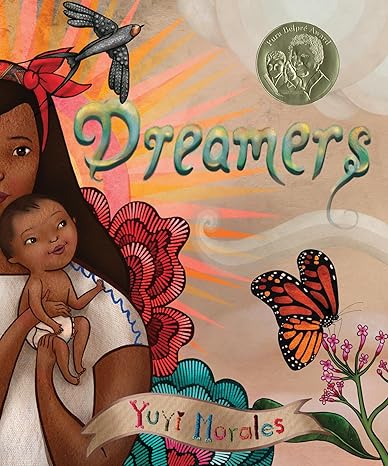
This cover showcases an enchanting illustration of a woman cradling a baby in her arms. The woman appears on the left border of the cover. She is wearing a white shirt, and only half of her face and body are visible. The woman has warm, brown skin, black eyes, and long dark hair, and she has a red bandana tied like a headband on her head. The entirety of the baby is visible. Its skin is also a warm brown, and it also has dark hair and eyes.
A bird appears above the woman, and large floral designs peak out from behind her. A monarch butterfly is perched on a pink flower on the right side of the cover. The background depicts clouds and the sun in shades of tan, pink, orange, and yellow.
The title "Dreamers" is written in a whimsical, swirled font in green and blue in the upper portion of the cover, with the author's name, Yuyi Morales, on a small banner near the bottom center of the cover. An embossed Pura Belpré Honor Book seal is visible in the top right corner.

Title: Dreamers
Author: Yuyi Morales
Awards: Pura Belpré Illustrator Award
Location of Ban: York, Pennsylvania
Date of Ban: November, 2020 - September, 2021
Reason for Ban: “What we are attempting to do is balance legitimate academic freedom with what could be literature / materials that are too activist in nature, and may lean more toward indoctrination rather than age-appropriate academic content” - Central York School District Board.
Outcome: The School Board, which voted unanimously in November 2020 to ban teachers from using hundreds of books, articles, and video materials in the classroom, voted unanimously on September 21, 2021, to reverse the ban.

This cover is bright and dynamic. The background is a white and golden-yellow starburst background, featuring rays of alternating color that spread outward from a single point. A young boy, dressed in tennis shoes, white and blue underpants, a red and silver luchador mask stands triumphantly with his arms outstretched. A ring of red stars surrounds him.
At the top of the page, black text reads "Yuyi Morales presents." Beneath the young boy, Niño Wrestles the World is presented in bold, stylized, decorative lettering. A gold, embossed Pura Belpré Award seal is featured in the top right corner of the cover, indicating the book has won honors.

Title: Niño Wrestles the World
Author: Yuyi Morales
Awards: Pura Belpré Illustrator Award
Location of Ban: York, Pennsylvania
Date of Ban: November, 2020 - September, 2021
Reason for Ban: “What we are attempting to do is balance legitimate academic freedom with what could be literature / materials that are too activist in nature, and may lean more toward indoctrination rather than age-appropriate academic content” - Central York School District Board.
Outcome: The School Board, which voted unanimously in November 2020 to ban teachers from using hundreds of books, articles, and video materials in the classroom, voted unanimously on September 21, 2021, to reverse the ban.

This cover features a dark, haunting image of a two-story house at night, with shadows and eerie greenish tones. Dark clouds appear behind the house and a dull, sepia-toned lawn appears in front of it. The center of the house's upper floor and attic appear to be peeled away, revealing an oversized image that depicts peeled layers encircling a serious, young person's face. On the porch, a shadowy figure stands near the front door.
The title "In the Dream House" is written in large white text at the top, with "A memoir" in smaller, italicized text just above the title. Beneath the title, a quote from the Washington Post reads: "A page turner of psychological suspense... A literary treasure." The author's name, Carmen Maria Machado, appears at the bottom of the cover in white text.

Title: In the Dream House: A Memoir
Author: Carmen Maria Machado
Awards: Lambda Literary Award in LGBTQ Nonfiction, Judy Grahn Award for Lesbian Nonfiction, many other honors
Location of Ban: Texas
Date of Ban: 2021 - ongoing
Reason for Ban: LGBTQIA+ themes; sexual content
Outcome: Leander ISD in Texas removed the book from an optional reading list for extracurricular books clubs. The book also appeared on former Texas Representative Matt Krause’s list of 850 books he wanted removed from ISD libraries.

The illustration on this cover shows a joyful interaction between a young girl and her abuela (grandmother) with a vibrant parrot between them. The grandmother has lightly tanned skin and gray hair, and she is dressed in yellow, red, and purple. She is seated on the left of the cover and the girl, who has brown hair and lightly tanned skin, is wearing a red dress and standing on the right side. The grandmother and the girl are smiling as they lean toward the parrot, who sits on a perch on a table. The parrot is yellow, orange, and green, much like a ripening mango fruit.
The title "Mango, Abuela, and Me" appears in red text at the top of the cover. At the bottom of the page, black text appears between the legs of the illustrated table and gives the author's name, Meg Medina, and the illustrator's name, Angela Dominguez.
A round, silver, embossed seal appears on the bottom right of the cover and reads Pura Belpré Honor Book. A black and blue circle on the lower left of the cover, indicates Meg Medina's title as National Ambassador for Young People's Literature.

Title: Mango, Abuela, and Me
Author: Meg Medina, illustrated by Angela Dominguez
Awards: Pura Belpré Author & Illustrator Honors
Location of Ban: York, Pennsylvania
Date of Ban: November, 2020 - September, 2021
Reason for Ban: “What we are attempting to do is balance legitimate academic freedom with what could be literature / materials that are too activist in nature, and may lean more toward indoctrination rather than age-appropriate academic content” - Central York School District Board.
Outcome: The School Board, which voted unanimously in November 2020 to ban teachers from using hundreds of books, articles, and video materials in the classroom, voted unanimously on September 21, 2021, to reverse the ban.

The top half of this cover features a black-and-white photograph of a group of African American men and women participating in a demonstration while holding American flags. The bottom half of the cover fades into a sepia-toned image of a Latinx group who appear to be marching while holding religious paintings and an American flag, hinting at solidarity and shared struggle.
The Center of the book has a black background. The title, An African American and Latinx History of the United States, appears in bold red, yellow, and blue letters, and the author’s name, Paul Ortiz, appears beneath it in white. The overall tone is serious, evoking historical activism.
Immediately beneath the title, white text reads, "Ambitious, original, and enlightening." That text is followed by the name Ibram X. Kendi, and the words "Author of Stamped from the Beginning," indicating that Mr. Kendi made the statement.

Title: An African American and Latinx History of the United States
Author: Paul Ortiz
Awards: PEN Oakland-Josephine Miles Award for Excellence in Multicultural Literature
Location of Ban: Pennsylvania & Texas
Date of Ban: 2020-2021
Reason for Ban: “may lean more toward indoctrination rather than age-appropriate academic content” - Central York School District Board.
Outcome: The book was banned in the Central York School District from 2020-2021 but was reinstated in response to protests and media attention. It was banned pending investigation in two Texas ISDs. It also appeared on former Texas Representative Matt Krause’s list of 850 books he wanted removed from ISD libraries.

This cover is minimalistic, with a soft cream background. The name "ALMA" appears in large, blocky letters shaded in pale red, and the subtitle “and How She Got Her Name” is written in smaller, delicate gray text underneath. At the bottom of the page, neat text gives the author's name, Juana Martinez-Neal.
Below the title stands a small girl, Alma, wearing red and white striped pants, a white t-shirt, black shoes, and a shy smile. She has pale skins and a small, red bow in her hair, and she is holding a pencil while looking up toward her name on the cover. A tiny bird perches on the letter "A" in Alma’s name, and it seems to be the thing that is drawing her gaze. The cover has a whimsical, gentle tone, enhanced by soft, hand-drawn illustrations.
On the right side of the cover, what appears to be an embossed sticker depicts a person riding a horse and reads "Caldecott Honor Book: indicating that the book won an award.

Title: Alma and How She Got Her Name
Author: Juana Martinez-Neal
Awards: Caldecott Medal
Location of Ban: York, Pennsylvania
Date of Ban: November, 2020 - September, 2021
Reason for Ban: “What we are attempting to do is balance legitimate academic freedom with what could be literature / materials that are too activist in nature, and may lean more toward indoctrination rather than age-appropriate academic content” - Central York School District Board.
Outcome: The School Board, which voted unanimously in November 2020 to ban teachers from using hundreds of books, articles, and video materials in the classroom, voted unanimously on September 21, 2021, to reverse the ban.

This cover has a bright yellow background with a simple line drawing of a woman's profile in pink. It overlaps a simple line drawing of a cityscape with skyscrapers sketched in blue. The artwork conveys themes of dual identity, with the woman’s profile juxtaposed against an urban background.
The title of the book, How the García Girls Lost Their Accents, appears in bold black text near the top of the page. Above the title, an edited quote from The New York Time Book Review reads "Poignant. Powerful. Beautifully captured the threshold experience of the immigrant, where the past is not yet a memory." The author's name, Julia Alvarez, appears near the bottom of the page in the same black font as the title. Beneath it, text reads "Author of In the Time of Butterflies." On the left, small text that follows the curve of the illustration reads "A Novel."

Title: How the García Girls Lost Their Accents
Author: Julia Alvarez
Awards: PEN Oakland-Josephine Miles Award for Excellence in Multicultural Literature
Location of Ban: Arkansas, North Carolina
Date of Ban: 2005, 2007
Reason for Ban: Profanity, sexual conduct
Outcome: Removed from all classroom and school libraries in Johnson County, North Carolina.

This cover features a stylized black ink sketch of a woman's face and upper body in profile, set against a solid purple background. An orange butterfly with exaggerated wings is illustrated overlapping the woman's head. The title, In the Time of Butterflies, appears in large white font on the upper portion of the cover. Above the title is a quote from People Magazine that reads "A gorgeous and sensitive novel." The author's name, Julia Alvarez, is displayed prominently in white across the bottom of the cover. Text beneath the author's name reads "Author of How the García Girls Lost Their Accent."
On the left, there is a circular yellow label indicating this is the "25th Anniversary Edition." On the right, in small print that follows the shape of the illustration are the words "A Novel."

Title: In the Time of the Butterflies
Author: Julia Alvarez
Awards: National Book Critics Circle Award, American Library Association Notable Book, The Big Read Selection
Location of Ban: Florida, New York & Pennsylvania
Date of Ban: 2000 (NY), 2020-2021(PA), ongoing (FL)
Reason for Ban: Banned in New York for including a drawing of a bomb. Banned in Pennsylvania for a year for “lean[ing] toward indoctrination” but later reinstated. Banned in certain school districts in Florida for “sexual content.”
Outcome: Escambia County Schools in Florida have banned 1,600 books, including One Hundred Years of Solitude (as well as five different dictionaries), because state law HB 1069 forbids materials with “sexual content” from being available in schools.
© McLennan Community College
1400 College Drive Waco, Texas 76708, USA
+1 (254) 299-8622